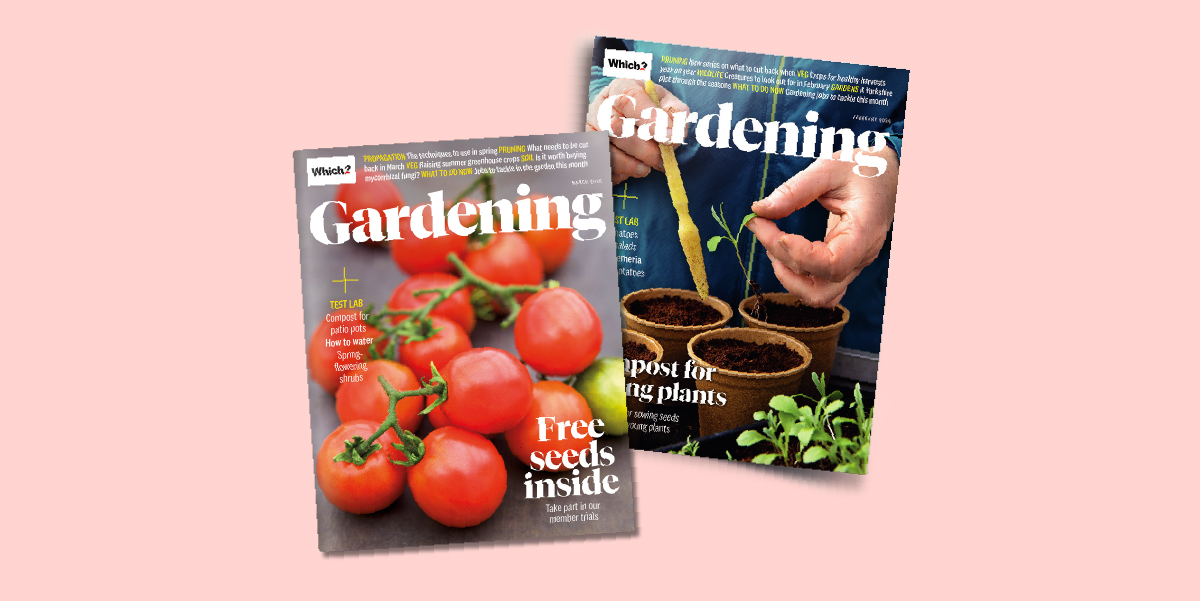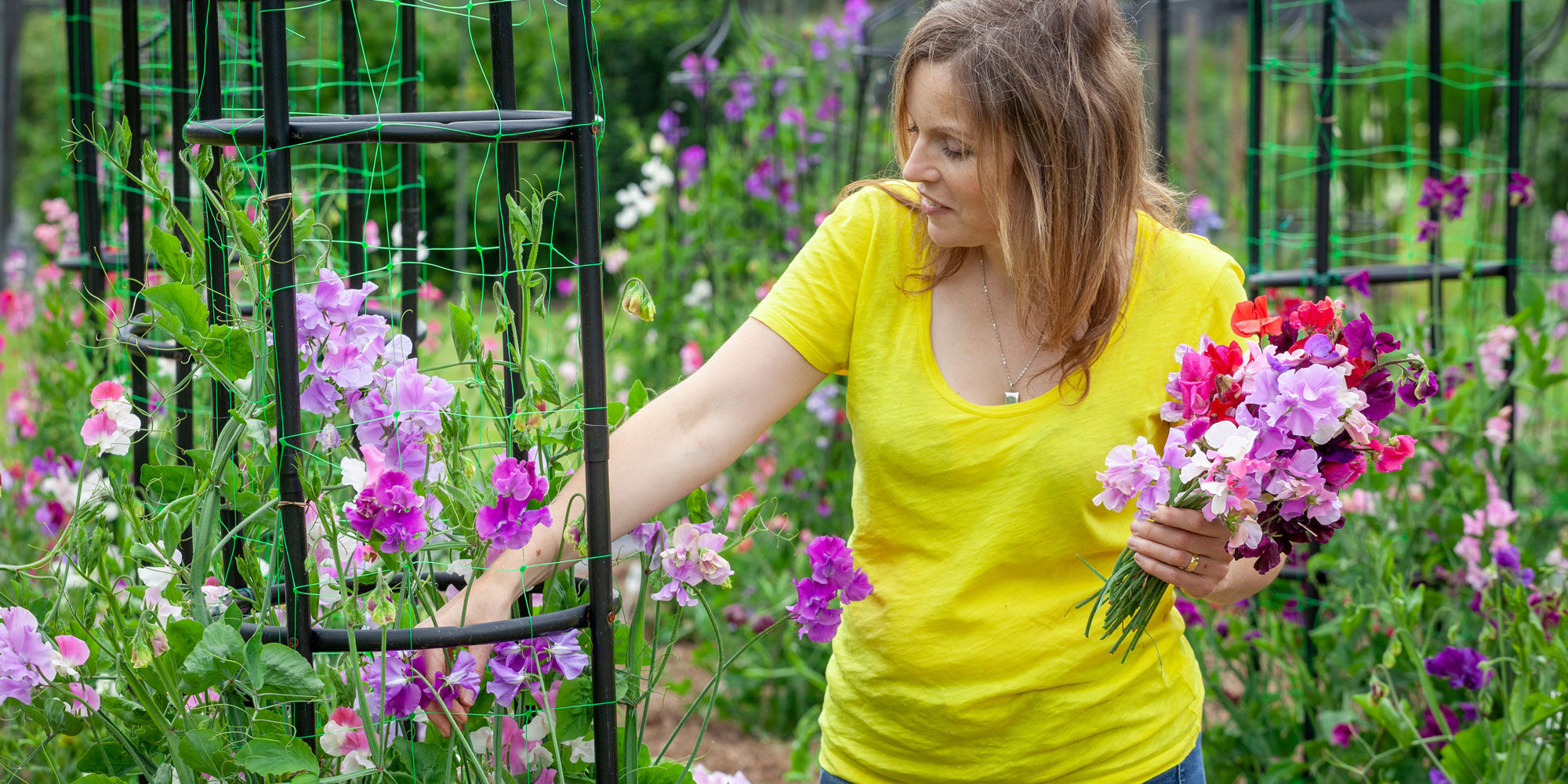
Powerpacked gifts
Give the gift of a better garden! Treat someone to year-round expert tests and advice for only £34.30 - saving 30%
Buy and saveSave 30% – was £49, now £34.30 for a year, offer ends 15 March 2026
By clicking a retailer link you consent to third-party cookies that track your onward journey. This enables W? to receive an affiliate commission if you make a purchase, which supports our mission to be the UK's consumer champion.

The colourful blooms of sweet peas, held on long, straight stems, make perfect cut flowers. Plus, the more you pick them, the more buds form to make fresh flowers. Not all varieties have their famous scent so check out recommended varieties.
They’re easy to grow as well. Most are climbers, which can be trained up teepees of canes, but you can also buy dwarf varieties for pots and baskets. It's best to sow the seeds in October for planting the following spring, but you can also sow in spring. Sweet peas are annuals which are raised from seed to flower the same summer and then die. There is a perennial cousin called Lathyrus latifolius, which has pink or white flowers, but unfortunately it's not scented.
Which? Gardening magazine grew a range of popular varieties to see which would give us the best display.

Sow seeds during October for the best results. When a Which? Gardening magazine compared spring-sown and autumn-sown plants, the autumn ones established quicker when planted and produced the best display of flowers.
Alternatively, wait until February/March.
Once germinated, move your sweet pea seedlings to a cool, sheltered spot such as a coldframe or unheated greenhouse. They don’t like being frosted, so cover them with fleece during very cold weather.
The plants should go in the ground in March or early April.
Pick sweet peas regularly to encourage them to keep blooming. At the end of the season, leave some flowers to set seed so you can collect it for sowing in autumn.
Spencer varieties are the ideal type for cutting, as the stems are particularly long – sometimes more than 30cm – and the blooms are large and fragrant. The first couple of flushes of flowers on most sweet-pea varieties will have straight stems, but after this the climbing tendrils may entwine the flower stems, causing them to bend. Keen growers snip off these tendrils, remove sideshoots and tie the sweet peas to their support to get the best blooms and stems.
In hot summers, sweet peas finish flowering earlier. They're usually finished by mid-summer so it's useful to have some late-flowering annuals, such as cosmos, to follow them. They often suffer from powdery mildew which coats the leaves in white. Once they stop blooming, pull up the plants and compost them.

Give the gift of a better garden! Treat someone to year-round expert tests and advice for only £34.30 - saving 30%
Buy and saveSave 30% – was £49, now £34.30 for a year, offer ends 15 March 2026
Which members can log in now to see the full results and which are our Best Buy varieties. If you're not a member, join Which? to get instant access.
| Variety name | Overall rating | Flowering duration | Flower impact | Display | Scent | Pests & diseases |
|---|---|---|---|---|---|---|
| 'Albutt Blue' | Sign up to reveal Get instant access to this and all our scores and recommendations Unlock tableDigital first month £5, then £8.99 per month, cancel at any time. Already a member? | |||||
| 'America' | ||||||
| 'April in Paris' | ||||||
| 'Betty Maiden' | ||||||
| 'Black Knight' | ||||||
| 'Cream Eggs' | ||||||
| 'Gwendoline' | ||||||
| 'Turquoise Lagoon' | ||||||
| 'White Supreme' | ||||||
Sign up to reveal
Get instant access to this and all our scores and recommendations
Unlock tableDigital first month £5, then £8.99 per month, cancel at any time.
Already a member?
Log in
The more stars the better. OVERALL RATING Ignores price and is based on flowering duration 30%, flower impact 20%, scent 30%, display 10%, pests and diseases 10%
| Variety name | Overall rating | Germination | Flowering duration | Scent | Flower coverage | Pests & diseases | Flowering impact | Garden worthiness |
|---|---|---|---|---|---|---|---|---|
| 'Albutt Blue' | Sign up to reveal Get instant access to this and all our scores and recommendations Unlock tableDigital first month £5, then £8.99 per month, cancel at any time. Already a member? | |||||||
| 'America' | ||||||||
| 'Cupani' | ||||||||
| 'High Scent/More Scent' | ||||||||
| 'Janet Scott' | ||||||||
| 'King Edward II' | ||||||||
| 'Memories' | ||||||||
| 'Painted Lady' | ||||||||
Sign up to reveal
Get instant access to this and all our scores and recommendations
Unlock tableDigital first month £5, then £8.99 per month, cancel at any time.
Already a member?
Log in
The more stars the better. OVERALL RATING Ignores price and is based on: germination 5%, flowering period 25%, scent 20%, flower coverage 10%, pest and diseases (resistance) 10%, impact (includes ratings both for display in the garden and as a cut flower) 20%, garden worthiness 10%. Garden worthiness is a subjective rating based on how this variety compares to others.
| Variety name | Overall rating | Germination | Flowering duration | Impact of display | Weather resistance | Pest & diseases | Fragrance |
|---|---|---|---|---|---|---|---|
| 'Continental Mixed' | Sign up to reveal Get instant access to this and all our scores and recommendations Unlock tableDigital first month £5, then £8.99 per month, cancel at any time. Already a member? | ||||||
| 'Cupid Pink' | |||||||
| 'Fragrant Tide' | |||||||
| 'Sugar n Spice' | |||||||
| 'Supersnoop Mixed' | |||||||
| 'Sweetie Mix' | |||||||
Sign up to reveal
Get instant access to this and all our scores and recommendations
Unlock tableDigital first month £5, then £8.99 per month, cancel at any time.
Already a member?
Log in
The more stars the better. OVERALL RATING Score ignores price and is based on: flowering duration 45%, impact of display 25%, fragrance 10%, pest and disease resistance 10%, weather tolerance 5%, germination 5%.
| Variety name | Overall rating | Flowering duration | Flower impact | Display | Scent | Pests and diseases |
|---|---|---|---|---|---|---|
| 'Anniversary' | Sign up to reveal Get instant access to this and all our scores and recommendations Unlock tableDigital first month £5, then £8.99 per month, cancel at any time. Already a member? | |||||
| 'Blue Velvet' | ||||||
| 'Just Jenny' | ||||||
| 'Lady Nicholson' | ||||||
| 'Lipstick' | ||||||
| 'Restormel' | ||||||
| 'Valerie Harrod' | ||||||
| 'White Supreme' | ||||||
Sign up to reveal
Get instant access to this and all our scores and recommendations
Unlock tableDigital first month £5, then £8.99 per month, cancel at any time.
Already a member?
Log in
The more stars the better. OVERALL RATING Score ignores price and is based on: flowering duration 30%, flower impact 10%, display 20%, scent 30%, pest and disease resistance 10%.
Which? Gardening magazine trialled a number of the different sweet pea varieties at our trial ground in North London.
We sowed them in October and grew them in our coldframes through the winter until April, when we planted them outdoors. The varieties for pots were planted in pots and hanging baskets.
The ordinary varieties were tied in and deadheaded weekly, and sprayed with insecticide to control aphids and prevent viruses spreading.
Throughout summer we noted how strong the scent was, how much flower coverage the plants had and if any were affected by pests or diseases. We also assessed them for the length and thickness of their stems to see if any would be good for cut flowers.
They’re divided into two groups: grandiflora and Spencer types. Spencer types have big, frilly blooms and, despite their name, grandifloras have smaller flowers and stronger scents.
Modern breeding has blurred these divisions, though. Nowadays, grandifloras are claimed to have both the big flowers and long stems we look for in cut flowers, as well as the profusion of flowers and strong scent we love in the garden.
Seed breeders have produced dwarf varieties that don’t need training and trail over the edges of pots and baskets. See our Best Buy varieties for pots above. Plant out in April in pots orhanging baskets. Use a Best Buy compost for containers and mix in a Best Buy controlled-release feed.
Wet soils, warm days and cold nights can make plants drop their buds. It’s nothing to worry about and they’ll soon recover as the nights warm up.
Sweet pea plants with virus have several symptoms: leaves become mottled, growth becomes stunted and flowers are speckled with another colour.
The virus is spread by infected sap. This is usually spread by aphids feeding plant to plant, although it can also be spread on cutting tools, so clean them between plants.
Unfortunately, once a plant has virus it can't be cured. The best advice is to remove it before the infected sap can be spread to surrounding plants. Controlling aphids will help to avoid virus problems in the future.
In dry summers, powdery mildew can become a problem. Keep plants well watered but don’t wet the leaves. Spraying with a suitable fungicide can slow its spread.
Read more about how to treat powdery mildew on plants